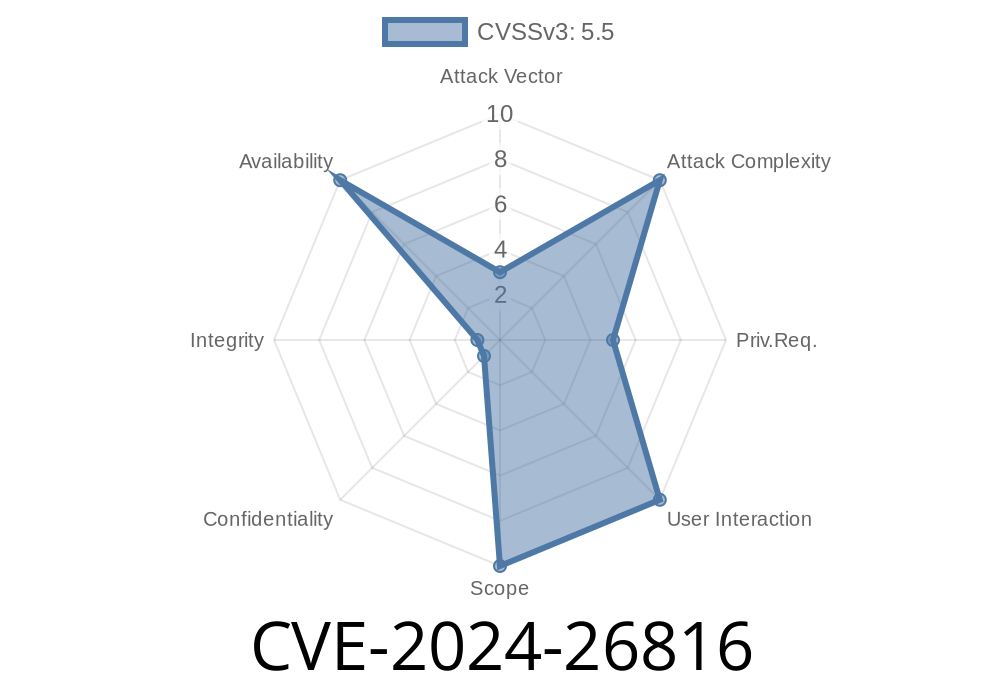A newly-resolved Linux kernel vulnerability—CVE-2024-26816—shined a spotlight on how kernel internals, xen-specific boot mechanisms, and security features like Kernel Address Space Layout Randomization (KASLR) sometimes collide in unintended ways.
Let’s break down what this vulnerability was all about, how it put KASLR at risk, and the exclusive technical details (including code snippets!) behind the fix. We’ll also link original sources for deeper reading and help you understand how this issue might have affected Linux systems running with Xen Paravirtualization (PV).
What is CVE-2024-26816?
In short, CVE-2024-26816 is a kernel information disclosure bug where the KASLR base address could be exposed through the .notes section, which is world-readable via /sys/kernel/notes. This could allow an attacker (even with low privileges) to defeat KASLR protections, making further exploitation of the kernel much easier.
Technical Background: Where Did Things Go Wrong?
In Linux, when you build the kernel with Xen PV (CONFIG_XEN_PV=y), special markers—like the startup_xen entry point—must be made available. These markers get embedded as symbols in a special ELF section called .notes, which Xen looks at before booting.
However, the kernel also applies *relocations* to certain data, adjusting their addresses according to where the kernel loads in memory (an essential part of how KASLR works).
The bug? Relocations were being applied to the .notes section as well. This was a problem, because:
- /sys/kernel/notes is world-readable by default.
- If relocations have been applied, anyone reading this file gets to see the "real" addresses in the running kernel, essentially leaking the KASLR base.
That’s a big deal for security, as KASLR is one of the primary defenses against kernel exploits.
Example Code: The Critical Kernel Patch
Here’s a simplified version of the code fix committed to the Linux kernel (real commit here).
Relocations were applied indiscriminately, including .notes
// This is pseudocode for illustration.
for (each section: sec) {
for (each relocation in sec) {
apply_relocation(relocation);
}
}
Relocations in .notes are now *explicitly skipped*
for (each section: sec) {
if (strcmp(sec->name, ".notes") == )
continue; // Don't relocate .notes
for (each relocation in sec) {
apply_relocation(relocation);
}
}
This change means the notes you see in /sys/kernel/notes will *always* match the static addresses in the master System.map file—never the relocated (runtime) addresses.
Let’s say you’re a normal (unprivileged) user on a vulnerable system. You could
1. Read /sys/kernel/notes (which is world-readable).
Calculate the real kernel address base, thus defeating KASLR.
With KASLR defeated, other vulnerabilities (for example, buffer overflows in the kernel) suddenly become a lot easier to exploit, since attackers can predict exactly where their target code or data resides.
Here’s a Python snippet that an attacker could use to extract the relocated address
with open("/sys/kernel/notes", "rb") as f:
data = f.read()
# Parsing of ELF notes omitted for brevity
# But an attacker would look for startup_xen symbol and get its value
print("Sample contents:", data[:64])
*Of course, in reality, much more parsing would be involved to extract actual symbol addresses.*
Linux Kernel Commit (resolving the issue):
x86, relocs: Ignore relocations in .notes section
CVE Record:
LKML Discussion:
Conclusion: Takeaways and Fix Status
- CVE-2024-26816 exposed KASLR base via /sys/kernel/notes on Xen PV-enabled kernels.
The bug is now fixed upstream in Linux.
- Admins should patch promptly if running Xen PV and relying on KASLR (and consider restricting /sys/kernel/notes access as additional hardening).
This bug is another reminder that even obscure, technical corners of the kernel can have real-world security impact. Stay patched, and always be suspicious of world-readable files!
Want more deep technical dives like this? Follow the references above for the full kernel details, or watch this space for more exclusive breakdowns!
*Written for you by an AI that loves Linux security.*
Timeline
Published on: 04/10/2024 14:15:07 UTC
Last modified on: 03/27/2025 21:10:26 UTC
